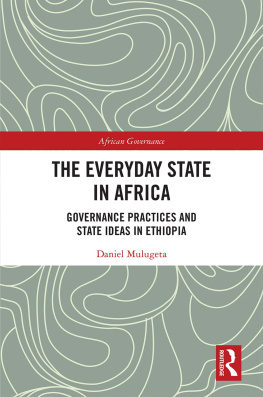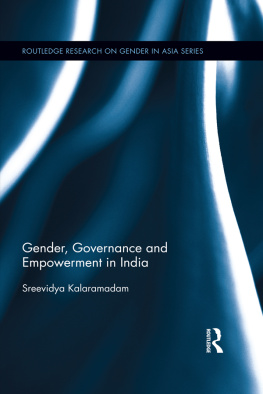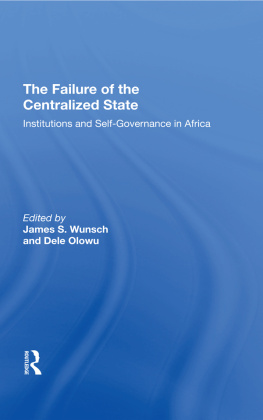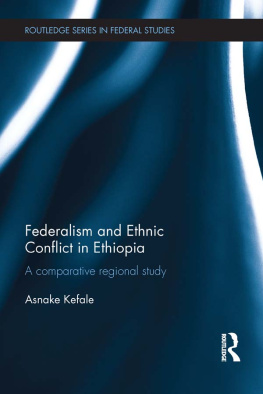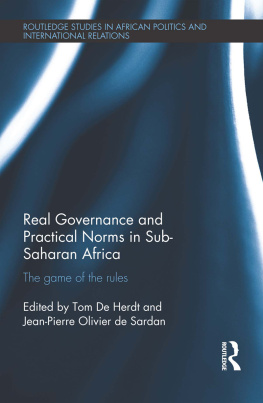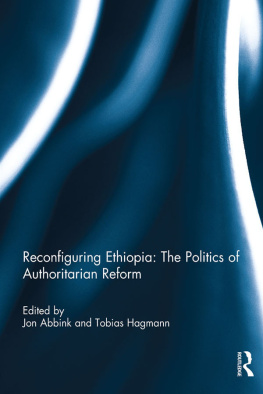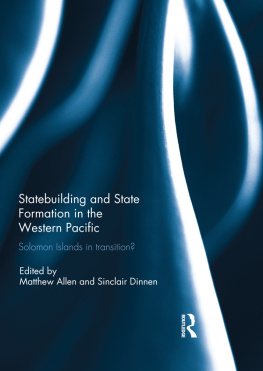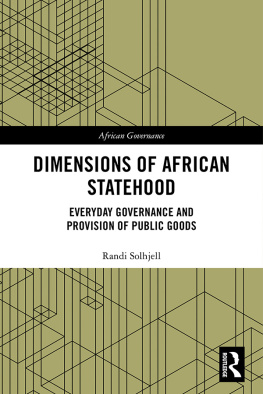The Everyday State in Africa
This book reconceptualises the idea of the state in Ethiopia. It focuses on the cultural and political processes of state formation, and reveals the complexity of statesociety relations as they unfold in the everyday context of local life. It does so by exploring specific configurations of governance practices, development activities and discourses, and bureaucratic representations that are rooted in the ongoing contingencies of power relations and social contexts. The book places the lives, subjectivities, and experiences of farmers, pastoralists, women, traders, shopkeepers, daily labourers, the rural youth, state functionaries, and NGO workers in two rural localities in different regions of Ethiopia at the centre of ethnographic enquiry.
The book offers a rich and compelling ethnographic account while making distinctive theoretical contributions to the analysis of the state in Africa. It foregrounds the Ethiopian experience as an important component of the politics of everyday life in Africa, at the same time as making important linkages between Ethiopia and politics in the rest of the continent that are often overlooked in Ethiopia-specific studies. Providing an invaluable insight into the workings of the state in Ethiopia, it will be of interest to scholars of state, society, development, governance, and African politics.
Daniel Mulugeta is a postdoctoral researcher at SOAS University of London, UK.
African Governance
11 Soldiers and the State in Zimbabwe
Godfrey Maringira
12 Islamist Foreign Policy in Sudan
Between Radicalism and the Search for Survival
Mohammed H. Sharfi
13 Dimensions of African Statehood
Everyday Governance and Provision of Public Goods
Randi Solhjell
14 Destabilising Interventions in Somalia
Sovereignty Transformations and Subversions
Debora Valentina Malito
15 Political Protest in Contemporary Kenya
Change and Continuities
Jacob Mwathi Mati
16 Infrastructure Development in Nigeria
A Political and Economic History
Michael O. Onolememen
17 Post-Election Violence in Africa
The Impact of Judicial Independence
Meshack Simati
18 The Everyday State in Africa
Governance Practices and State Ideas in Ethiopia
Daniel Mulugeta
For more information about this series, please visit: www.routledge.com
First published 2020
by Routledge
2 Park Square, Milton Park, Abingdon, Oxon OX14 4RN
and by Routledge
52 Vanderbilt Avenue, New York, NY 10017
Routledge is an imprint of the Taylor & Francis Group, an informa business
2020 Daniel Mulugeta
The right of Daniel Mulugeta to be identified as author of this work has been asserted by him in accordance with sections 77 and 78 of the Copyright, Designs and Patents Act 1988.
All rights reserved. No part of this book may be reprinted or reproduced or utilised in any form or by any electronic, mechanical, or other means, now known or hereafter invented, including photocopying and recording, or in any information storage or retrieval system, without permission in writing from the publishers.
Trademark notice: Product or corporate names may be trademarks or registered trademarks, and are used only for identification and explanation without intent to infringe.
British Library Cataloguing-in-Publication Data
A catalogue record for this book is available from the British Library
Library of Congress Cataloging-in-Publication Data
A catalog record has been requested for this book
ISBN: 978-0-367-19380-5 (hbk)
ISBN: 978-0-429-20204-9 (ebk)
Typeset in Bembo
by codeMantra
This book explores the production of state ideas in Ethiopia through the experiences of people living in two rural localities: the West Gojjam Zone of the Amhara Regional State and the Borana Zone of the Oromia Regional State. The focus is on state power, both as an idea and as a set of actual practices. It takes as its starting point the idea that the state is not a monolithic apparatus that is directly observable. All that one can observe is some of its manifestations and the effects that arise from ideas, practices of everyday lives, and social relationships of various types. This book emphasises in particular that different contexts and differently situated people promote different expressions of state power, so its discernible aspect varies contextually. In order to understand contemporary everyday processes of state-making, we need therefore to look at localised relational contexts and develop a proper set of contextual concepts. In this sense, the book pursues an ethnographic framework based on the concepts of governance, development, bureaucracy, and discourses. It reveals how the different meanings signified in practices associated with these different concepts inform the ways in which the state comes to be constructed in everyday life.
Ethnographic analysis enables us to understand not only the specificities and subtleties of the everyday production of state power and statesociety interaction but also the broader national dynamics shaping state formation processes. Studies of contemporary Ethiopia have tended to adopt traditional theoretical assumptions about politics that stem from an orientalist construction of a great tradition of history, in which the state is depicted as a centralised structure rather than as a series of effects produced through embodied everyday meanings and practices on multiple scales. Scholars of spatial thinking, on the other hand, generally reproduce orientalist representations by adopting a simple binary of a centre and periphery approach to Ethiopian statehood. At the same time, scholars writing about political culture and the state tend to interpret modern Ethiopian politics more from the perspective of what was supposed to be traditional, specifically Abyssinian, culture. To be sure, all these approaches capture important aspects of the Ethiopian state. However, from such perspectives, there is little way of knowing to what extent and how the state is produced and experienced at multiple levels in different locations. This book suggests an empirical illustration through the study of an intersection of relationships in a variety of sites. Although the approach here is not radically new, by attempting an ethnography of the Ethiopian state, I hope this book encourages its readers to step outside the state centrist views and the rigid framework of centre versus periphery and highland versus lowland, and look at the Ethiopian state with a fresh perspective.
This book focusses on ethnographic moments in the period leading up to the ascendance of Abiy Ahmed to the prime ministership in 2018, relying heavily on six months of field research in 2014 and 2015. This was a period characterised by efforts by the ruling Ethiopian Peoples Revolutionary Democratic Front (EPRDF) to institutionalise the ideology of the developmental state in both the organisation of the party and the state system. The sustaining of this development model, taken cumulatively, has resulted in economic growth and brought about dramatic changes in rural life and to local governance. It has massively expanded the state bureaucracy, created a new rural political class who bear the mantle of development, installed a sense of entitlement, given birth to everyday popular discourses of failed development, and fuelled moral outrage and a backlash against what is seen as the widespread problem of corruption and the failure of development projects.

